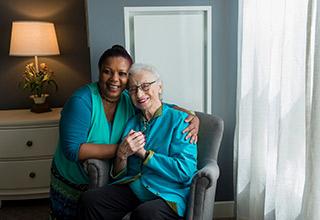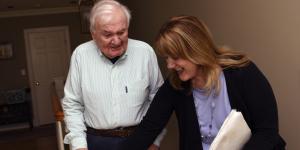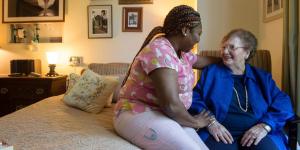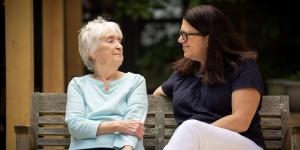Innovative Respite Care that Honors the Whole Person
How certified home health aides from the Deanna and Sidney Wolk Center for Memory Health support people living with dementia and their caregivers.

If you care for a person who is living with dementia, you may feel like you don’t always have enough time to meet your own needs. Many caregivers share that sentiment, as taking care of a partner, parent, or someone else important in your life can take up a great deal of time and energy.
At the same time, some caregivers can find it hard to trust anyone else with the person they care for. Even though you may know them best, that doesn’t mean you have to do it alone! Having alternative caregivers can benefit both you and the person you care for.
Several dedicated resources are available for caregivers of older adults. One example is Hebrew SeniorLife’s Innovative Respite Care Program. We send compassionate, state-certified home health aides to the homes of people living with dementia and their caregivers, which brings the comfort of knowing there’s someone trustworthy around to give companionship and personal care assistance. This not only helps caregivers take better care of themselves and their own health, but when they come back refreshed, they can actually be more attentive and engaged.
About the Innovative Respite Program
Respite care programs provide short-term relief for caregivers, giving them time to rest, relax, spend time with other family and friends, tend to their health needs, or do whatever they haven’t had the time for due to caregiving duties.
The Innovative Respite Program is unique because, in addition to providing in-home care to people living with dementia and their caregivers, it trains the home health aides who provide care. The program certifies students from local colleges and universities as home health aides, all of whom have studied in fields related to health care and want to gain hands-on clinical experience. The aides are then carefully matched with caregivers and people living with dementia based on preferences and scheduling needs. The result is a win-win: caregivers and people who have dementia receive affordable care, and home health aides gain valuable experience. Often, these connections form into beautiful and lasting relationships.
Serving people living with dementia and the caregivers who support them
In 2024, nearly 12 million Americans provided unpaid care for a loved one with dementia — a contribution valued at more than $413 billion. With so much on their plate caring for their loved one, many caregivers don’t spend time taking care of themselves. Prioritizing well-being can help protect against common health challenges such as sleep problems, high blood pressure, and depression, leading to better outcomes for both caregivers and the people they’re caring for.
You don’t need a caregiver to get assistance from the Innovative Respite Care Program! If you have a dementia diagnosis and need help around the house, companionship, or personal care, we may be able to match you with one of our home health aides. If you’re living alone with a dementia diagnosis and lack a support system, you could be more likely to experience the health effects of social isolation and loneliness. A home health aide can come to you and talk, do cognitively engaging activities, help you with laundry or housework, or even go for a walk around the block with you.
One caregiver, John, took advantage of the Innovative Respite Program when he realized he needed extra assistance caring for his life partner, Julie. (John and Julie’s names have been changed for their privacy.) They were matched with one of our amazing home health aides, Christine Lee, who was certified through the program.
Because Julie was already receiving care at the Wolk Center for Memory Health, her multidisciplinary care team suggested the program to John and noted that they might be a great fit. (You don’t need to be an existing Wolk Center for Memory Health patient to participate.)
Certifying home health aides
We understand how important it is for you to trust the person you leave your loved one home alone with. That’s why all of our aides undergo a rigorous background check, complete online and hands-on training, and obtain a state certification before they enter people’s homes for the first time. That includes specific training from the Alzheimer’s Association on caring for someone living with dementia. Additionally, one of our nurses accompanies the aide on their first visit.
Christine graduated from Harvard University in 2024. She decided to take a gap year to gain hands-on clinical experience while she applied for medical school. She also has multiple years of experience volunteering in nursing homes, including time volunteering with one person with Alzheimer’s disease who left a lasting impact on her. She hoped to take that experience to the next level. All of this led her to pursue her home health certification through the Innovative Respite Program.
“I not only wanted to continue this companionship with someone in a longitudinal fashion, but I also wanted to care for someone in a more medically relevant way, becoming more involved in their direct care and having a better sense of the holistic meaning of care — not just treatments or diagnoses, but what it means to walk with someone and see their day-to-day life,” she says.
Building meaningful bonds through care
Julie was diagnosed with early-onset dementia in her late 50s. Around a year ago, John realized he needed extra support with caregiving tasks.
After deciding to participate in the Innovative Respite Program, he and Julie were matched with Christine, who started coming to their home three days a week, giving John some time to focus on his interests and friendships.
As she got to know the couple, Christine was struck by the collection of personal works and artwork from Julie and John’s professional lives as academics that were displayed in their home. “It’s such a privilege to step into someone’s house and see the life they’ve built. It also helped me guide my care and approach to Julie, seeing what’s on the walls and what she gravitates towards,” she adds.
John appreciated how Christine honored Julie’s agency and legacy as a literary scholar with two PhDs. “Julie is an academic and really into poetry. Christine picked up on that, and I’d come back in after being out, and she’d be sitting there reading poetry to Julie or taking art books off the shelves and looking through them with her. Having someone who kept trying to experiment with ways of human contact meant a lot,” he notes.
Once Christine started coming to the house, John could stick to a personal commitment he made to himself to see a friend once a week. It was a nice way to get out of the house, have a good conversation, and unwind. Christine and Julie’s streamlined daily routine meant that when he went out on those evenings, he knew he would come home to find Julie relaxed in bed with the covers up and the lights off.
Christine was even the first to notice shortness of breath in Julie after their daily walk together, an unusual symptom that turned out to be a serious medical concern. “I’m not sure a one-time aide would have caught that,” adds John.
Dignity in care matters most to John and his family, and Christine’s training, empathy, and level of care were apparent. “A non-negotiable for my children and me is preserving how much autonomy and dignity we can maintain for Julie. She’s not just an object of care. She’s a person with a history. Christine wanted to know about Julie and her academic work. She humanized her,” he says.
Compassionate respite care that honors dignity
Caregiving isn’t easy, but it’s not a journey you have to walk alone. In addition to respite care, the Wolk Center for Memory Health offers other support for families and caregivers, including individual and family counseling, memory support groups, and resource coordination. We also provide comprehensive outpatient care related to brain health, cognitive and behavioral problems, and memory loss, whether due to Alzheimer’s disease, other dementias, or other neurological or psychiatric conditions.
Contact us online today to learn more about our Innovate Respite Program, or call me directly at 617-363-8664. Let’s work together to get you the extra support you need!
This project is supported by the Administration for Community Living (ACL), U.S. Department of Health and Human Services (HHS) as part of a financial assistance award totaling $6,607,011 with 75 percent funded by ACL/HHS and $1,620,872 with 25 percent funded by non-government source(s). The contents are those of the author(s) and do not necessarily represent the official views of, nor an endorsement, by ACL/HHS, or the U.S. Government.
Blog Topics
Learn More
Wolk Center for Memory Health
The Deanna and Sidney Wolk Center for Memory Health at Hebrew SeniorLife provides outpatient memory care services, in person and virtually, for people living with cognitive symptoms — and for their families and caregivers.

Home Health
Hebrew SeniorLife Home Health will send registered nurses and home health aides to your home to provide skilled care any time you need it.




